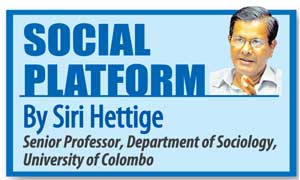Reply To:
Name - Reply Comment
Last Updated : 2024-05-10 12:42:00
 Sri Lanka has perhaps the highest density of state officials when compared with the size of its population. We also have perhaps the largest number of people holding political office for a country of its size and with the most number of cabinet of ministers in all the world. It is not necessarily a bad thing to have a sizeable state bureaucracy, so long as the functionaries in state institutions provide their services and perform their functions efficiently and effectively. Yet, the presence of a plethora of public institutions and a large body of state functionaries is meaningless unless they have the skills and other means necessary to provide a useful service to the general public.
Sri Lanka has perhaps the highest density of state officials when compared with the size of its population. We also have perhaps the largest number of people holding political office for a country of its size and with the most number of cabinet of ministers in all the world. It is not necessarily a bad thing to have a sizeable state bureaucracy, so long as the functionaries in state institutions provide their services and perform their functions efficiently and effectively. Yet, the presence of a plethora of public institutions and a large body of state functionaries is meaningless unless they have the skills and other means necessary to provide a useful service to the general public.
Add comment
Comments will be edited (grammar, spelling and slang) and authorized at the discretion of Daily Mirror online. The website also has the right not to publish selected comments.
Reply To:
Name - Reply Comment
US authorities are currently reviewing the manifest of every cargo aboard MV
On March 26, a couple arriving from Thailand was arrested with 88 live animal
According to villagers from Naula-Moragolla out of 105 families 80 can afford
Is the situation in Sri Lanka so grim that locals harbour hope that they coul
3 hours ago
3 hours ago

09 May 2024
09 May 2024
09 May 2024